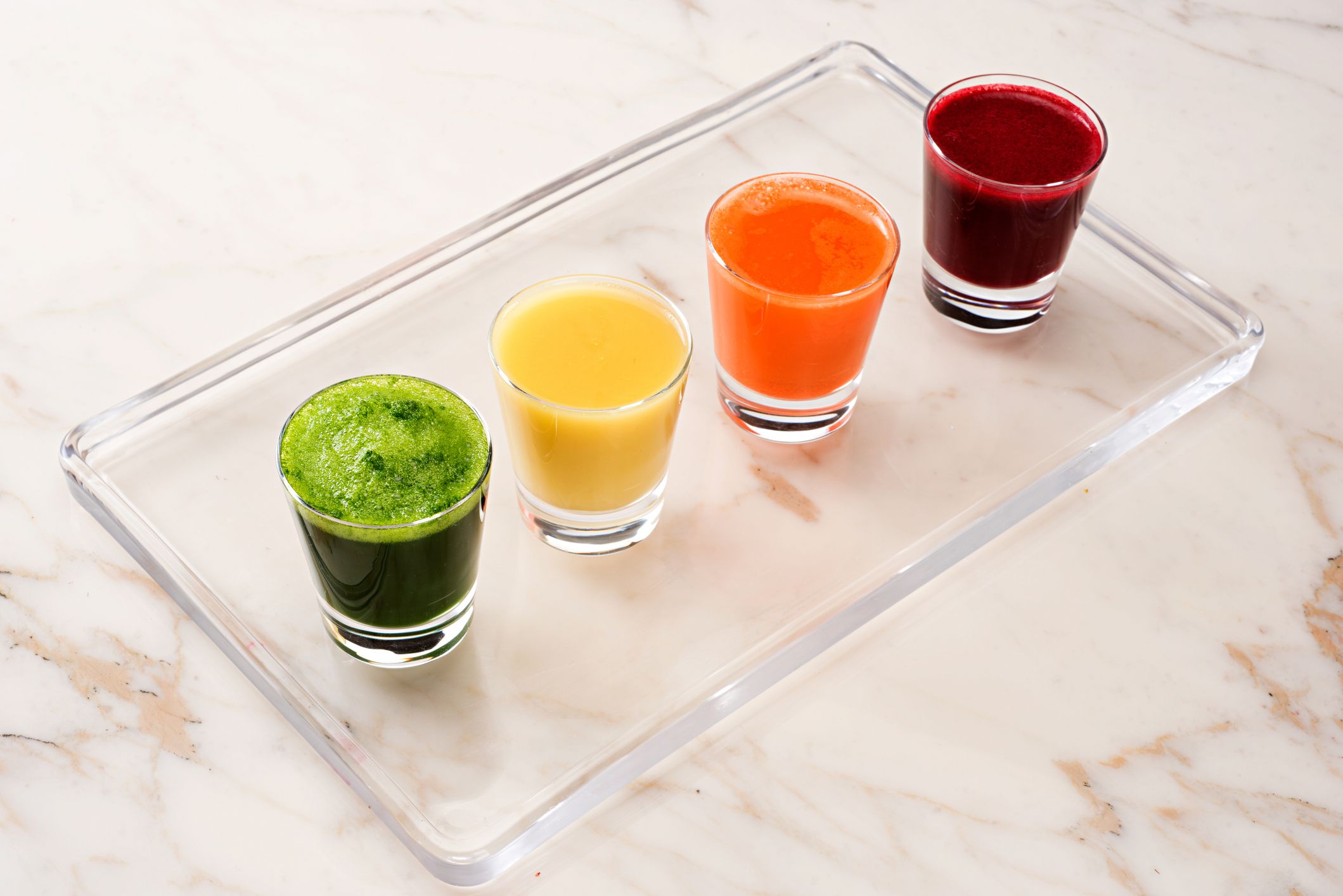You might think you’ve seen it all when it comes to apple cider vinegar. And that’s fair enough, considering it appears on Instagram in everything from simple salad dressings to influencers’ “fat-burning” elixirs. But these days, the substance is taking yet another form: apple cider vinegar gummies.
Think of it as your daily multi-gummy reimagined to deliver the supposed benefits of apple cider vinegar. They tend to contain around 500 milligrams (equivalent to a few teaspoons) of ACV per serving, but other ingredients vary from brand to brand. BeLive, for instance, boasts a sugar-free recipe, and Goli claims its formula includes vitamins B9 and B12.
The appeal is pretty clear: The gummies are, in theory, a more pleasant way to incorporate apple cider vinegar into your diet than, say, drinking the stuff raw or swallowing the supp in pill form. In fact, the great taste of Goli gummies comes up in a ton of Amazon reviews, along with other words of praise. Users claim they have plenty of benefits, from reducing bloat to curbing appetite. But are they really all they’re cracked up to be?
Marissa Meshulam, registered dietitian and founder of MPM Nutrition, and Brigitte Zeitlin, registered dietitian and owner of BZ Nutrition, weigh in below on this latest iteration of the ACV trend.
What do apple cider vinegar gummies supposedly do?
Before we dive in, keep in mind that there’s an important distinction between apple cider vinegar in its raw, unfiltered form and gummy form. “We don’t necessarily know that the gummies are doing anything, because there’s no research on them,” Meshulam says. Bottom line: Any health benefits associated with apple cider vinegar haven’t been linked to the actual gummy kind yet.
Here’s what we know about the main claims attached to apple cider vinegar in liquid or oral supplement form.
Help you lose weight
Apple cider vinegar on its own isn’t going to be a magic pill for weight loss, but it *might* give you an edge if you’re already working towards a weight-loss goal via nutrition and exercise changes, according to Meshulam. There’s some interesting research out there on this front, but it comes with a few caveats. More on that later.
Strengthen your gut health
You might see claims that apple cider vinegar has prebiotic or probiotic properties. Quick refresher: Probiotics are the “good” bacteria in your gut that support digestive health and your immune system. Meanwhile, prebiotics “feed” those bacteria.
The ACV fermentation process does create bacteria, according to Meshulam. “However, for something to be considered a probiotic, it must contain enough healthy bacteria to promote a health benefit,” she says. So far, we don’t have the research to prove that. And while apples are rich in pectin, a prebiotic, a tablespoon of apple cider vinegar (roughly two gummies, depending on the brand) probably doesn’t contain enough of the fiber to count as your dose of prebiotics for the day, Meshulam says. Put simply, don’t rely on ACV alone to support the healthy bacteria in your gut.



Still, it can aid digestion: The acetic acid in apple cider vinegar can help people with low levels of stomach acid to break down food, WH previously reported. Plus, ACV can promote motility, Zeitlin says—in other words, it keeps things moving in your GI system.
Support your immune system
Probiotics (and the prebiotics supporting them) are good for your immune system. The good bacteria can basically “nudge out” harmful bacteria, and some probiotics actually boost the production of antibodies, Meshulam says. But again, don’t rely on ACV alone to support these beneficial bacteria.
Support heart health
Acetic acid helped to lower “bad” cholesterol in rats while raising their “good” cholesterol in one older study from The British Journal of Nutrition. The study didn’t include people, though, so take the results with a grain of salt.
Boost your energy
Apple cider vinegar doesn’t have a special nutrient that should make you feel more energetic, Meshulam notes. However, ACV could provide more consistent energy throughout the day by preventing blood sugar spikes (and the crashes that come along with them, which make you feel exhausted), she explains.
Side note: Some brands (like Goli, Garden of Life, and Vitafusion) say their ACV gummies include as much as 250 percent of your daily rec for vitamin B12. Since a B12 deficiency can cause tiredness, they could help your energy level if you’re deficient. But this is probably not the case if you’re someone who eats animal-based products, Zeitlin notes.
Improve your skin
ACV has anti-inflammatory properties, and your skin can reap the benefits, given that skin issues like acne and redness are signs of inflammation, Zeitlin says. Still, it’s not the first thing you should turn to if you’re hoping to boost your skin health.
Relieve heartburn
ACV might help with heartburn (since the moderate acid could, in theory, bring down the pH of your stomach), WH previously reported. But the study at the heart of this claim wasn’t peer-reviewed or published. There’s no data in medical journals indicating that apple cider vinegar can safely or effectively relieve heartburn, according to Harvard Medical School, and Zeitlin says most evidence is anecdotal, so the effectiveness will depend on the person.
Reduce bloating
It’s not always clear what’s causing bloat, but one potential culprit is small intestinal bacterial overgrowth (which can result in “bad” bacteria creating gas), according to Harvard Medical School. ACV “creates an environment where good bacteria is more fruitful,” and the good bacteria kills bad bacteria, Zeitlin says.
Detoxify the body
This is one of those claims that isn’t supported by science in any way. “The truth is, if you have a healthy, working liver and healthy, working kidneys, your body is naturally detoxifying all day, every day on its own,” Zeitlin says. You don’t need a supplement to do that for you.
You might also see claims that ACV can actually clean out your arteries, but let’s be clear: This isn’t legit. The idea, according to Harvard Medical School, is that a substance related to acetic acid can pull metals out of the bloodstream, so ingesting ACV could help dissolve plaque in the arteries. But as Harvard Medical School explains, don’t buy into these unproven claims.
Do apple cider vinegar gummies help with weight loss?
There is some research linking apple cider vinegar consumption and weight loss, but the relevant studies tend to be pretty small, according to Meshulam. One, for instance, published by the Journal of Functional Foods in 2018, took place over 12 weeks and included 39 participants. All of the subjects followed a restricted calorie diet, but some of them also consumed apple cider vinegar—and they lost more weight.
There are a couple of ways through which ACV could help you shed pounds, Meshulam says. For one thing, the acetic acid may help keep food in your stomach for longer, and therefore keep you feeling satiated.
Blood sugar regulation also comes back into play here. “When our blood sugar spikes really high, insulin is released to lower it,” Meshulam says. “And insulin is also a hormone that tells your body there’s a ton of food available.” So, in theory, if blood sugar isn’t spiking all the time, this fat storage hormone isn’t being released as much either.
Ultimately, there’s good news and bad news when it comes to weight loss and the ACV gummies in particular. On the plus side, they should contain enough apple cider vinegar to be beneficial per relevant research findings, Meshulam says. For instance, some studies had people consuming two tablespoons of ACV per day—that’s about four Goli gummies, and you can take up to six. But she also notes that appetite suppression may be somewhat related to the vinegar taste, and you won’t get that with a sweet gummy.
Again, there’s no magic pill (or in this case, gummy). Both Meshulam and Zeitlin say incorporating ACV into an otherwise unhealthy diet won’t lead to weight loss—what you’re eating matters.
Are there side effects of taking ACV gummies?
One thing to note is that gummies have added ingredients. “The gummies usually come with a good amount of sugar, and a lot of other stabilizers and things to get it in that gummy form,” Meshulam says. These things aren’t always harmful or even bad, but her thought is that it’s best to keep nutrition as simple as possible. Plus, supplements aren’t regulated by the FDA, so we don’t really know everything that might be in them, Zeitlin points out.
As for ACV in general, it can interact with some supplements and drugs, like diuretics and insulin, according to the Mayo Clinic. People with diabetes should avoid taking ACV products like this, as they can lower your blood sugar, and pregnant and breastfeeding women should also skip them.
Bottom line: Make sure to talk to your doctor before starting to take any new supplement.
So, should I buy apple cider vinegar gummies?
You may be better off saving your money. Meshulam and Zeitlin agree that it’s better to buy a bottle of the actual vinegar if you want to incorporate ACV into your diet. “I would always, always, always opt for the actual food version,” Zeitlin says, because you know what’s in it.
But don’t take a shot of raw apple cider vinegar, as it can hurt your esophagus, Meshulam says. Instead, try putting a few teaspoons in your salad dressing, marinades, or sparkling water if your interested in incorporating ACV into a nutritious diet.
Source: Read Full Article
